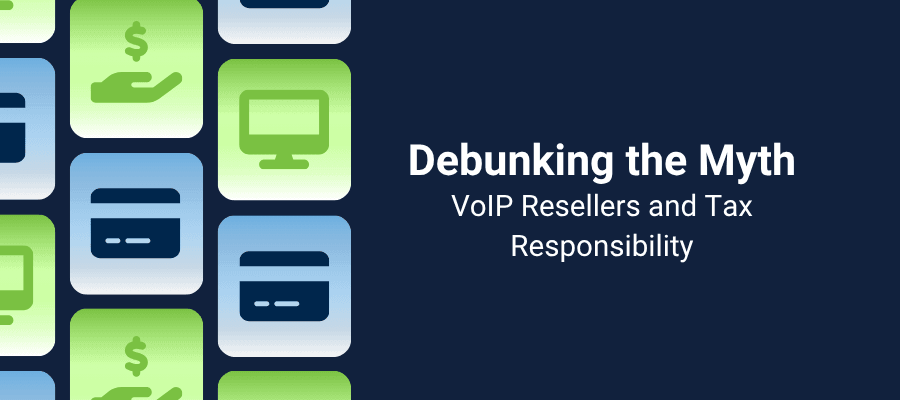Blogs
Recent Blogs
Popular Blogs
VoIP Service Providers often mistakenly believe they don't owe taxes and fees directly to the government, as long as they pay what their underlying carriers or hosted providers charge them. This is a common misconception. The Federal and State regulators assign the responsibility of collecting and paying taxes to the retail service provider, irrespective of whether they may have already paid somewhere up the supply chain.
Don't be fooled by suppliers saying “We have you covered!" VOIP Service Providers and Resellers must register and pay communications taxes.
The common misconception, that VOIP service providers and resellers of telecommunications services do not need to pay taxes and regulatory fees, such as Universal Service Fund surcharge, to government agencies as long as they pay taxes and fees billed by their suppliers (i.e., wholesalers), is a dangerous myth. Many resellers mistakenly believe that an underlying carrier or hosted switch provider can pay taxes and fees on their behalf.
Unfortunately, that’s not how it works. A retail voice provider cannot contract away its own regulatory and taxing responsibilities. A supplier cannot pay taxes and fees on behalf of a reseller customer. More than likely, this myth derives from a misunderstanding of the general prohibition on “double taxation” and a fundamental misinterpretation of the supply-chain tax and regulatory fee exemption system in the United States.
This blog is intended to inform and to dispel the myth that telecommunications resellers, including VoIP service providers, do not have any registration or remittance obligations for taxes and regulatory fees. Retailers bear the responsibility of billing, collecting, and remitting taxes and regulatory fees on sales of telecommunication services to their end-user customers, regardless of whether:
- The retailer has already paid taxes and fees to its suppliers, in the form of pass-through charges.
- The retailer’s suppliers have already paid taxes and regulatory fees on the same services.
Regulatory Fees
VoIP service providers and resellers have independent obligations to register and pay Federal and State USF fees on telecommunications services sold to end-user customers. At the federal level, resold telecommunications services are ONLY exempt from paying pass-through USF fees to their underlying carrier or supplier if they can prove that they are registered and contribute directly to the USF.
If a reseller of telecommunications services is unable to prove they are a contributor to USF, then the reseller is responsible for USF pass-through charges from its wholesale supplier. Alternatively, a reseller that is registered with the FCC and is listed as a USF contributor on the FCC website, is exempt from pass-through charges, thus preventing duplicative USF contributions.
Taxation
As with federal regulatory fees, retailers of resold telecommunications services may be subject to state and local taxation, regardless of whether their suppliers remitted such taxes. As with the USF, resellers must register and remit applicable taxes directly to authorities for sales of services to end-user customers. Registered resellers that provide proof of registration and remittance to their suppliers should not be assessed pass-through taxes. If the reseller cannot prove proof of registration (via a resale exemption certificate), the wholesale provider must treat sales of services the reseller as “end-user” sales and bill taxes on the sales to the reseller.
Wholesale providers cannot pay taxes “on behalf of” their reseller customer. In other words, paying pass-through taxes to the wholesale provider does not eliminate the reseller’s independent duty of registration and remittance of applicable taxes on its own retail sales.
Most states require service providers to prove their tax exemption status by submitting a valid resale certificate. Many states allow providers to complete a state-generated resale exemption form and remit it annually to their suppliers. For sales taxes, many states accept a “multi-state” reseller tax exemption form. Others have their own specific forms, which vary by jurisdiction and tax type.
For more details please refer to the FCC website.

Not Convinced? Get the Answers You Need!
Not fully convinced? That's okay! We understand that making a decision takes time and information. Fill out our quick contact form and we'll be happy to answer any questions you have, address any concerns, and provide you with additional information to help you make an informed decision.

